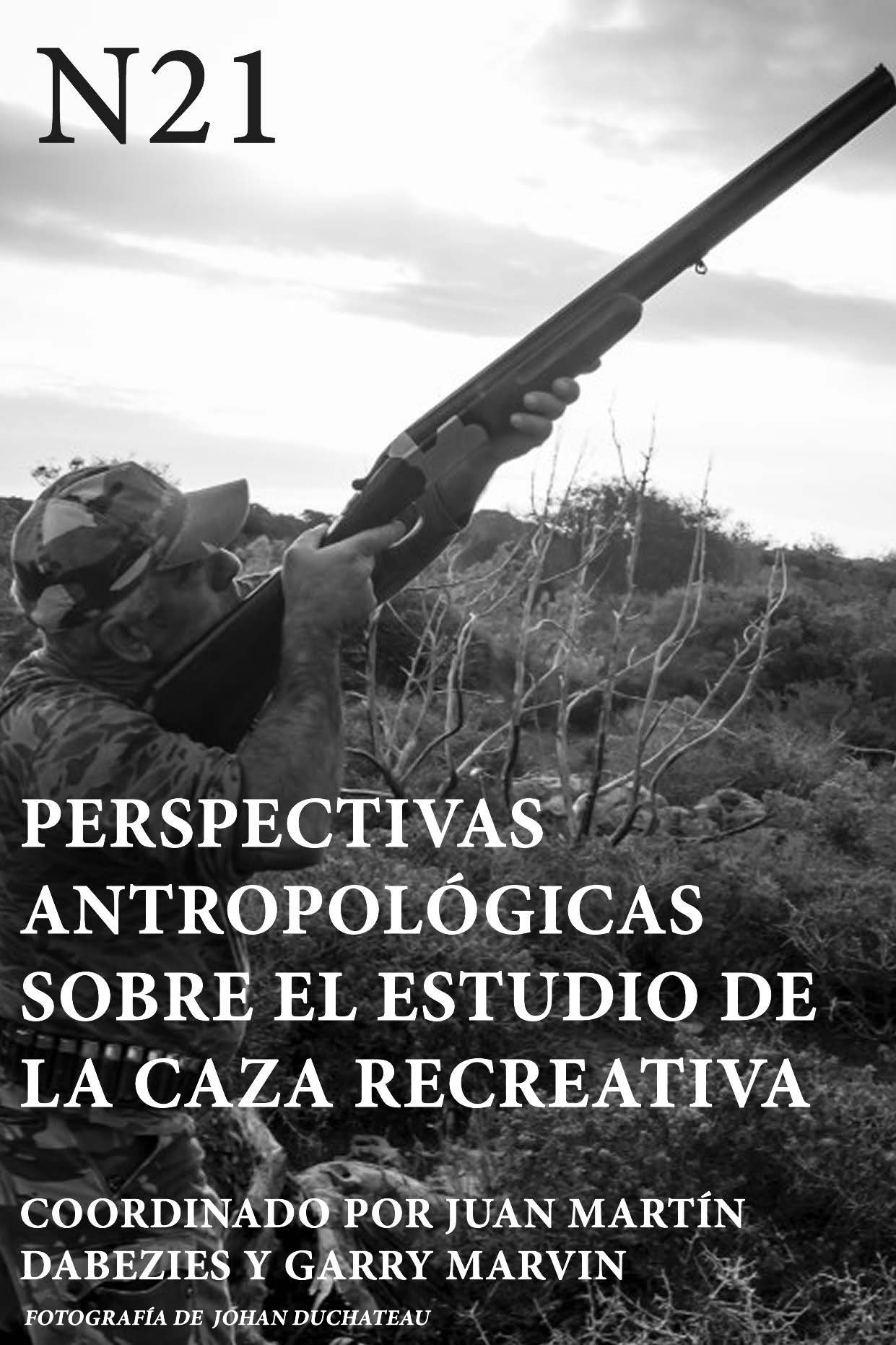Resumen
En este artículo ofrezco una exploración sensorial de los paisajes de la caza en la Alemania contemporánea. En un primer momento, muestro cómo estos paisajes se construyen y se estructuran materialmente como paisajes culturales a través de las prácticas de caza. En el resto del artículo, examino más específicamente cómo los cazadores perciben este paisaje mientras se dedican a cazar y buscar animales de caza. Basándome en la fenomenología de la percepción de Merleau-Ponty, describo no sólo los “objetos” que los cazadores señalan en este paisaje como relevantes para su práctica. Y lo que es más importante, amplío la percepción desde el mero “reconocimiento de objetos” hasta la percepción hábil de las relaciones gestálticas perceptivas en el paisaje, guiadas por las sensaciones incorporadas. La percepción de los cazadores, así concebida, se convierte en una práctica atmosférica dentro del entramado de todo un mundo meteorológico elemental. Concluyo mostrando cómo una comprensión fenomenológica de la percepción de los cazadores podría ayudar a los etnógrafos a abrir nuevos horizontes de mundos más que humanos.
Citas
Anderson, David (2002) Identity and Ecology in Arctic Siberia: The Number one Reindeer Brigade. Oxford: Berg.
Bender, Barbara, and Winer, Margot (ed.) (2001) Contested Landscapes: Movement, Exile and Place. Oxford: Berg.
Böhme, Gernot, and Böhme, Hartmut (1996) Feuer, Wasser, Erde, Luft. Eine Kulturgeschichte der Elemente. München: Beck.
Böhme, Hartmut (2000) “Anthropologie der Vier Elemente”. In: Kunst- und Ausstellungshalle der Bundesrepublik (ed.) Wasser. Köln, pp. 17-38.
Edensor, Tim (2017) “Aurora Landscapes: Affective Atmospheres of Light and Dark”. In Benediktsson, Karl and Lund, Katrin Anna (ed.) Conversations With Landscape. Farnham: Ashgate, pp. 227-240.
Genath, Peter (2005) ‘Es geht fast täglich auf den Brocken ...!’ Der Arbeitsalltag der Ranger im Nationalpark Hochharz aus volkskundlicher Perspektive. Münster: Waxmann.
Gieser, Thorsten (2016) “Notes from the forest: Engaging with a hunter’s world of materials”. Available at http://www.materialworldblog.com/2016/11/notes-from-the-forest-engaging-with-a-hunters-world-of-materials/.
Gieser, Thorsten (2018) “The experience of ‘being a hunter’: Towards a phenomenological anthropology of hunting practices”. Hunter-Gatherer Research, 3: 227-251.
Gieser, Thorsten (2018) “Killing a wounded sow: a phenomenological approach to a problematic hunting situation”. In Thiemo Breyer & Thomas Widlok (eds) The Situationality of Human-Animal Relations: Perspectives from Anthropology and Philosophy. Bielefeld: Transcript.
Gieser, Thorsten (2020) “Hunting wild animals in Germany: conflicts between wildlife management and ‘traditional’ practices of Hege”. In Michaela Fenske & Bernhard Tschofen (eds.) Managing the Return of the Wild: Human Encounters with Wolves in Europe. London: Routledge, pp. 164-179.
Grasseni, Cristina (2004) “Skilled Vision. An Apprenticeship in Breeding Aesthetics”. Social Anthropology, 12: 41-55.
Grasseni, Cristina, and Gieser, Thorsten (2019) “Skilled Mediations: Introduction”. Social Anthropology (Special Section on Skilled Mediations) 27(1): 6-16.
Haraway, Donna (2008) When Species Meet. Minneapolis: Minnesota University Press.
Grasseni, Cristina, and Gieser, Thorsten (2016) Staying with the Trouble: Making Kin in the Chthulucene, Durham and London: Duke University Press.
Heidegger, Martin (2012) Der Ursprung des Kunstwerks. Frankfurt: Klostermann.
Ingold, Tim (2000) The Perception of the Environment: Essays, in Livelihood, Dwelling and Skill. London: Rotledge.
Ingold, Tim (2011) Being Alive: Essays on Movement, Knowledge and Description. London: Routledge.
Ingold, Tim (2017) Anthropology and/as Education. London: Routledge.
Lehmann, Albrecht (1999) Von Menschen und Bäumen. Die Deutschen und ihr Wald. Hamburg: Rowohlt.
Lehmann, Albrecht/Schriewer, Klaus (Hg.): Der Wald. Ein deutscher Mythos? Berlin: Reimer.
Lindner, Kurt (1956) Die Lehre von den Zeichen des Hirsches. Berlin: De Gruyter.
Lorimer, Jamie; Hodgetts, Timothy, and Barua, Maan (2019) “Animals’ Atmospheres”. Progress in Human Geography, 43: 26-45.
MacDougall, David (2006) The Corporeal Image. Film, Ethnography, and the Senses. Princeton: Princeton University Press.
Macnaghten, Phil/Urry, John (1998) Contested Natures. London: Sage.
Merleau-Ponty, Maurice (2005) Phenomenology of Perception. London: Routledge.
Moore, Lisa Jean, and Kosut, Mary (2014) Buzz. Urban Beekeeping and the Power of the Bee. New York: New York University Press.
Ogden, Laura (2011) Swamplife: People, Gators, and Mangroves Entangled in the Everglades. Minneapolis: Minnesota University Press.
Ortega y Gasset, José (2007) Meditations on Hunting. Belgrade: Wilderness Adventures Press.
Pink, Sarah (2007) Doing Sensory Ethnography. London: Sage.
Prinz, Sophia (2014) Die Praxis des Sehens. Über das Zusammenspiel von Körpern, Artefakten und visueller Ordnung. Bielefeld: Transcript.
Schriewer, Klaus (1995) Waldarbeiter in Hessen. Kulturwissenschaftliche Analyse eines Berufsstandes. Marburg: AVK.
Schriewer, Klaus (2015) Natur und Bewusstsein. Ein Beitrag zur Kulturgeschichte des Waldes in Deutschland. Münster: Waxmann.
Schroer, Sara, and Schmitt, Susanne (eds.) (2018) Exploring Atmospheres Ethnographically. London: Routledge.
Waldenfels, Bernhard (2000) Das leibliche Selbst. Vorlesungen zur Phänomenologie des Leibes. Frankfurt/Main: Suhrkamp.

Esta obra está bajo una licencia internacional Creative Commons Atribución-NoComercial-CompartirIgual 4.0.
Derechos de autor 2021 La Universidad de Sevilla se reserva todos los derechos sobre el contenido de las revistas científicas tuteladas por su editorial. Los respectivos textos no pueden ser utilizados, distribuirse, comercializarse, reproducirse o transmitirse por ningún procedimiento informático, electrónico o mecánico con ánimo de lucro, directo o indirecto, ni tampoco incluirse en repositorios ajenos, sin permiso escrito de la Editorial Universidad de Sevilla. La distribución de estas obras derivadas se debe hacer con una licencia igual a la que regula la obra original y podrán ser usados y citados para fines científicos y referenciados con transformación para usos académicos, indicándose en todo caso la autoría y fuente, pudiendo para ello remitir al correspondiente enlace URL de Internet

